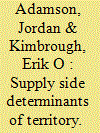| Srl | Item |
| 1 |
ID:
190836


|
|
|
|
|
| Summary/Abstract |
This article introduces a simple application of contest theory that neatly captures how Boulding’s ‘loss of strength gradient’ determines the geographic extent of territory. We focus on the ‘supply side’ of territorial conflict, showing how the costs of initiating and escalating conflict over spatially dispersed resources shape the nature and scope of territory. We show that economies of scale in the production of violence and varying costs of projecting power at a distance combine to affect the intensive and extensive margins of conflict, and ultimately the geographic distribution of territory. Comparative statics analysis shows how the distribution of conflict and territory change as costs change, helping shed light on, for example, why new transportation technologies have historically led to a redrawing of territorial boundaries. We test and probe the boundaries of this model in two experiments varying the marginal costs of conflict over space and the fixed costs of entry. Increases in both costs interact to increase the probability of exclusive territories. The first experiment directly tests the theory in a static, one-shot setting that strictly matches the information conditions studied in the theory. The second experiment examines conflict behavior under conditions analogous to those in conflicts outside the lab: where no contestant knows the probability of winning, let alone the function determining that probability, and parties interact repeatedly. Median behavior closely tracks equilibrium predictions in all treatments.
|
|
|
|
|
|
|
|
|
|
|
|
|
|
|
|
| 2 |
ID:
133704


|
|
|
|
|
| Publication |
2014.
|
| Summary/Abstract |
We design an experiment to explore the impact of earned entitlements on the frequency and intensity of conflicts in a two-stage conflict game where players may attempt to use non-binding side-payments to avoid conflict. In this game, Proposers make offers and Responders decide simultaneously whether to accept the offers and whether to engage in a conflict. A simple theoretical analysis suggests that Proposers should never offer side-payments because Responders should always accept them and then still choose to enter conflict; however, our experiment reveals that some individuals use this non-binding mechanism to avoid conflict. Moreover, when subjects earn their roles (Proposer or Responder), conflicts are 44% more likely to be avoided than when roles are assigned randomly. Earned entitlements impact behavior in three important ways: (1) Proposers who have earned their position persistently make larger offers; (2) larger offers lead to a lower probability of conflict; but (3) Proposers whose offers do not lead to conflict resolution respond spitefully with greater conflict expenditure. Hence, with earned rights, the positive welfare effects of reduced conflict frequency are offset by higher conflict intensity. This result differs from previous experimental evidence from ultimatum games in which earned entitlements tend to encourage agreement and increase welfare; thus, our findings highlight the important consequences of endogenizing the costs of conflict. Our analysis suggests that earned entitlements alter behavior by influencing the beliefs of Proposers about the willingness of Responders to accept a peaceful resolution. As a result, these Proposers make persistent high offers, and when their beliefs are disappointed by a Responder's decision to accept a side-payment and still enter conflict, they retaliate.
|
|
|
|
|
|
|
|
|
|
|
|
|
|
|
|